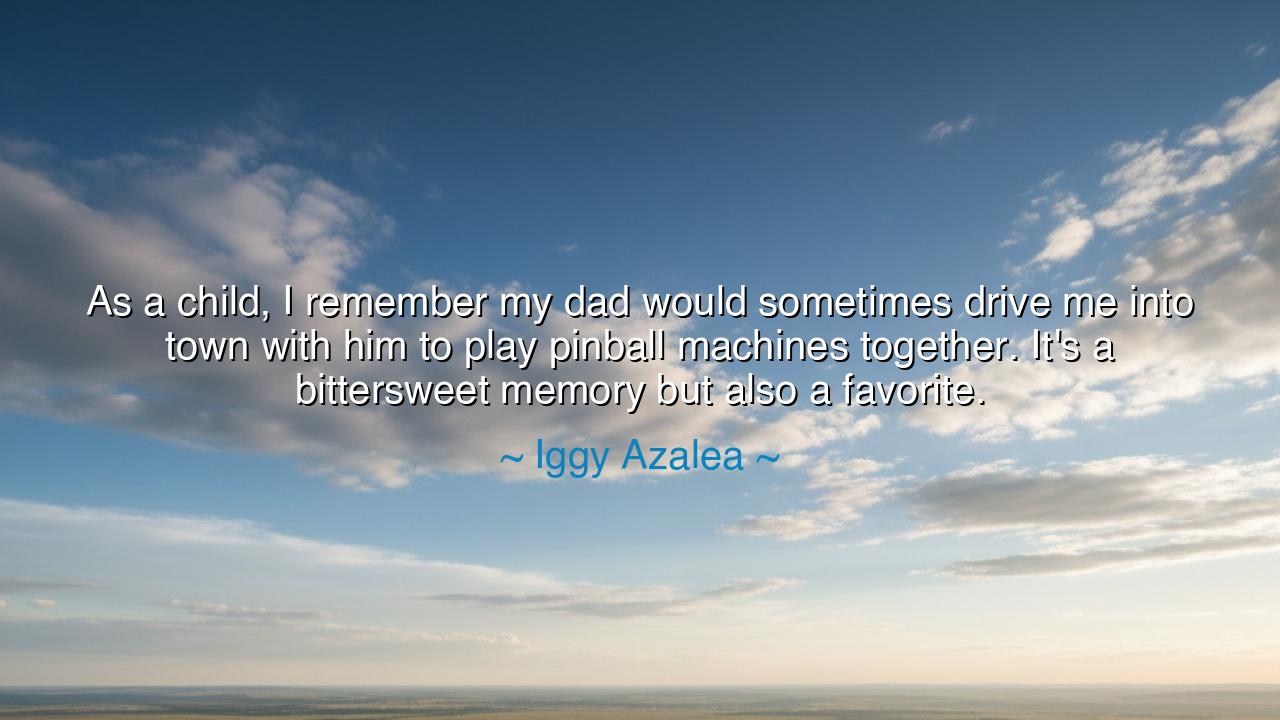
As a child, I remember my dad would sometimes drive me into town
As a child, I remember my dad would sometimes drive me into town with him to play pinball machines together. It's a bittersweet memory but also a favorite.






In the tender and reflective words of Iggy Azalea, we hear the music of memory and the quiet ache of time: “As a child, I remember my dad would sometimes drive me into town with him to play pinball machines together. It's a bittersweet memory but also a favorite.” Though the image is simple—a father, a daughter, a dusty road, and the flashing lights of a pinball machine—it carries the weight of the universal human experience: the longing for connection, the beauty of ordinary love, and the sorrow of moments that cannot return. Within these words lives the eternal truth that childhood is not measured in years, but in moments of shared wonder—and that even small joys become sacred when illuminated by the light of affection.
The origin of this quote lies in Iggy Azalea’s remembrance of her youth in rural Australia, far from fame, far from the glittering stages of the future. Before the world knew her as an artist, she was simply a child sitting beside her father, feeling the hum of the car, the rhythm of his presence, the laughter between games of pinball. There, in that simple companionship, she received one of life’s most precious gifts—the sense of being seen, of being cherished, of sharing joy without condition. The memory is bittersweet, as all true memories are, because time—like the silver ball in a pinball machine—moves quickly, ricocheting between laughter and loss before coming to rest in silence.
The ancients would have understood the sacredness of such recollections. They believed that memory was not just a function of the mind, but a bridge of the soul, connecting the mortal present with the eternal past. In the philosophy of Plato, memory was the echo of things divine—proof that the soul remembers love even when life forgets. To recall one’s childhood, then, is not mere nostalgia—it is a pilgrimage of the heart. For in remembering, we touch the threads that wove our becoming. And in the story of Iggy and her father, we see that love need not be grand to be eternal. Sometimes it is found in the hum of a car’s engine, the glow of arcade lights, or the warmth of a shared smile in the quiet hours of youth.
Consider the story of Helen Keller, who, though blind and deaf, found meaning through the love and patience of her teacher, Anne Sullivan. Every small lesson—each touch of a hand upon her palm—became a revelation. To Helen, these gestures were the pinball games of the soul, small exchanges that awakened vast worlds of feeling. Just as Iggy’s memory of playing with her father carries the sweetness of love and the sting of distance, so Helen’s recollection of learning her first word, “water,” was a moment both simple and infinite. It is through these small encounters that we discover the essence of human life: that the smallest moments are often the largest in meaning.
The word bittersweet is key to understanding this memory. For in every joy that time preserves, there is a quiet shadow of loss. The father who once smiled across the arcade may now be gone, or distant, or changed—but the love remains. This is the paradox of life: that beauty and sorrow are inseparable, that love’s brightest light always casts the deepest shadow. To call a memory bittersweet is not to mourn it—it is to acknowledge its fullness. The ancient poets called this feeling pathos, the harmony of joy and grief that gives life its depth. Iggy’s recollection, then, is not only personal—it is universal. It is the shared ache of all who have loved and lost, laughed and longed, remembered and grown.
In this way, her story becomes a mirror for us all. We, too, carry within us these hidden moments—the sound of a parent’s laughter, the scent of summer air, the warmth of a hand that once held ours. And though time may carry those days away, they remain alive within us, shaping who we are. The lesson is not to dwell in the past, but to honor it—to let those memories teach us gratitude, tenderness, and patience. For in remembering the love we were given, we are reminded to give love in return—to our children, our friends, our world.
The lesson, then, is this: treasure the ordinary moments, for they are the true treasures of life. Greatness is not found in achievements alone, but in the quiet acts of connection that outlast them. If you have a parent, speak to them; if you are a parent, make time for your child—not in grand gestures, but in shared laughter, simple games, or stories at dusk. Life is fleeting, and its meaning is gathered not from monuments, but from memories. Like Iggy’s father, you may never know which moment will linger forever—but you must live as though every one might.
So, dear listener, let this truth dwell in your heart: when the years have faded, and the applause has ended, it will not be the victories that warm you, but the bittersweet memories—the small, shining moments when love was simple, and presence was enough. Cherish them now. Create them often. For these are the pinball lights of the soul, flickering joyfully in the darkness, guiding us home through the long and tender corridors of time.






AAdministratorAdministrator
Welcome, honored guests. Please leave a comment, we will respond soon